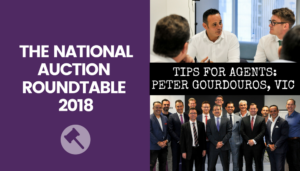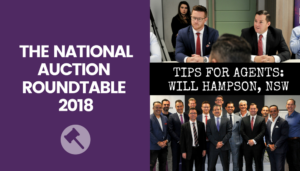Other videos in this series

Using auctions in your marketplace: Josh Hart
Other videos in this series TRANSCRIPT I think in my marketplace one of the key things is actually using auction. We’re a marketplace which doesn’t

Using auctions to build on experience: Karl Secondis
Other videos in this series TRANSCRIPT My advice to an agent coming into real estate is to embrace the auction process because it is a

National Auction Round Table: The Skills of Great Auctioneers with Justin Nickerson
Other videos in this series TRANSCRIPT Steve Carroll: I was talking to Nerida, the REA Economist, and she was saying that the climate is such

National Auction Round Table Part 7: The Role of Video and Social Media
Other videos in this series TRANSCRIPT Steve Carroll: Are agents using social media well to promote themselves? To promote auctions? I’ll kick off with yourself.

Asking your buyer the right questions: Matthew Scafidi
Other videos in this series TRANSCRIPT I think the best piece of advice for agents when running an auction campaign is to have a really

The importance of vendor communication: Peter Gourdouros
Other videos in this series TRANSCRIPT For all you agents that are thinking that auctions, you gotta remember that communication is the key. You got

Building a successful auction campaign: Will Hampson
Other videos in this series TRANSCRIPT So, what really makes a successful auction campaign is great marketing, stand-out marketing, presentation of the property, having really

National Auction Round Table Part 6: Auction Day
Other videos in this series TRANSCRIPT Steve Carroll: So I’m selling my house, this Saturday, it’s going to auction. What’s your advice to me as

Engaging with your buyers: James Bell
Other videos in this series TRANSCRIPT The advice I’d give to agents that I work with all the time is, clearly, to make sure that

National Auction Round Table Part 5: Becoming an Auctioneer
Other videos in this series TRANSCRIPT Steve Carroll: What’s the difference between an ordinary auctioneer and a very, very good auctioneer? James Bell: I think understanding the

Auction as a method of negotiation: Gavin Croft
Other videos in this series TRANSCRIPT In regards to auction, the one thing that I would have to say is that real estate agents look

Luck is not a strategy for auction day: Tom Panos
Other videos in this series TRANSCRIPT Guys and girls. Listen very carefully. The market no longer will put the deal together. Fear of missing out.

Working with buyers and sellers: Justin Nickerson
Other videos in this series TRANSCRIPT The one thing for me that I wish agents knew about auctions was how much influence they actually have

National Auction Round Table Part 4: Auction or Private Treaty?
Other videos in this series TRANSCRIPT Steve Carroll: If we go right back to the beginning – so, someone logs on, they’re in research mode

National Auction Round Table Part 3: Crucial Conversations
Other videos in this series TRANSCRIPT Steve Carroll: What I’m hearing from the table is there’s never been a time where the need to actually


Saturday is not the only day of the week: Alec Brown
Other videos in this series

Offering all the options to sellers: AJ Colman
Other videos in this series

National Auction Round Table Part 2: Relationship between Auctioneer and Agent
Other videos in this series TRANSCRIPT Steve Carroll: I want to talk the relationship between the agent and the auctioneer. You know, there’s never going

National Auction Round Table Part 1: Around the Grounds
Other videos in this series TRANSCRIPT Steve Carroll: Why don’t I kick off with, “What’s happening in the market at the moment?” We’ll kick off

TRANSCRIPT
